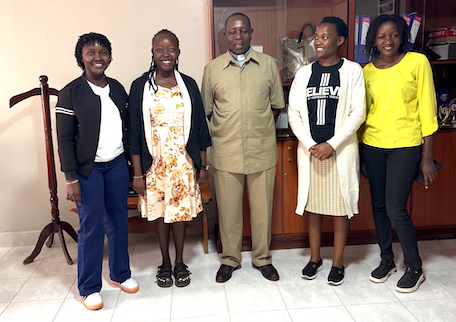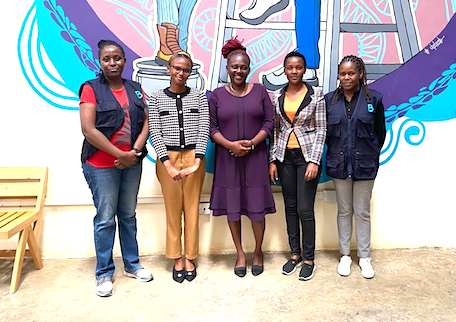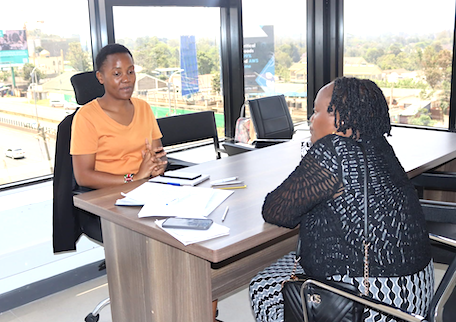Real Life Stories: People Trafficking in Kenya (Global Justice Kenya)
The latest in our series of partner interviews is with Valentina Cominetti and Naomi Nzilani. Their story was compiled by Liluye staff writer Sylvia Nalubega. Valentina is the Executive Director and Naomi is the Communications Officer at Global Justice Group (GJG) which is the parent company of Global Justice Kenya (GJK), an independent women-led non-governmental organization committed to upholding human rights by advancing the Right to a Remedy of victims of gross human rights violations and international crimes in Kenya.
To watch their interview, please watch below:
This is the Liluye interview of Valentina and Naomi:
How did you first get involved in being part of this work? In other words, what motivated you, or still drives you, to work on the issue of trafficking? Can you share a personal story?
Valentina said, “Before deciding to dedicate myself completely to the fight against human trafficking and modern slavery, I had worked with victims of international crimes in an American law firm, specifically researching networks of profiteers, enablers, aiders and abettors who could be held liable in civil litigation for redressing the victims’ suffering. Victims of international crimes face strenuous challenges, especially from a jurisdictional point of view in their pursuit of justice.
Despite all the effort put in fighting these crimes, human trafficking rates keep rising, making it one of the most profitable crimes throughout the world. Most of the international community looks at trafficking as an issue that must be tried in international courts or in criminal courts thus making it very difficult for the victims of trafficking to achieve an effective remedy. Therefore, I thought of starting an organization that would focus exclusively on bringing remedy (legal redress), especially in the form of compensation, to victims of trafficking in national courts through the national civil codes. This would hold the perpetrators, profiteers, enablers, aiders and abettors financially liable. We find legal pathways of recourse for the harm victims have suffered. The objective is not only to provide access to justice for the survivors, but to obtain compensation on their behalf, create a lifeline to reintegration, and, more importantly, to deter others from profiting out of this heinous crime. I do strongly believe that developing the law in this direction can strongly enhance the fight against trafficking. That’s how our journey began.”
Naomi said, “I was drawn to the issue of human trafficking through the work we’re doing here. Although I’m not a survivor myself, I’ve developed a strong desire to amplify survivors’ voices and ensure they are truly heard. My interest grew as I saw the impact of continued advocacy, fighting for their rights, creating space for their stories, and pushing for lasting change.”
What are the long-term implications of human trafficking, especially on women and girls?
The dramatic aspect of the fight against trafficking is that often victims who are targeted, trafficked, and then exploited are not aware of their basic rights. Often, they don’t even identify themselves as victims of trafficking. Often these people lack the basic understanding of their own human rights and are not aware of their entitlement to pursue justice. We therefore educate on access to justice, with a reparative purpose, as well as engage them in educational right literacy campaigns because awareness is the first line of defense and also prevention.
Share with us some of the things you are doing to support survivors of trafficking, or to prevent those who are vulnerable from going through it?
One of our main forms of support for survivors is access to justice for rescue and repatriation. We identify distressed individuals who are still in the hands of their traffickers and work on their behalf with the duty bearers to free them and take them back to their homes.
When it comes to Kenyan victims of trafficking abroad, the main duty bearer is the Ministry of Foreign Affairs. Through collaborative efforts with this institution, we have been able to repatriate 27 individuals in 2024 and we are currently working on dozens of active cases. When in need of rescue, victims of trafficking may be discouraged by communication challenges, difficulties in contacting the duty bearer, and in providing the information necessary to bring them back. We act as a catalyst, putting together their paperwork and following up with their case; informing them step by step.
For identification and communication, integrating survivors on our team has been essential. For instance, Feith Shimila Murunga, our Survivor Liaison Officer, has been integral in identifying and documenting over 300 trafficking cases. Documentation is the first step toward the pursuit of justice because without collating evidence there is no way to legal recourse. Feith, as a survivor of human trafficking herself and an advocate, has helped us not only create a safe and trusted reporting mechanism but also spreading awareness on the issue. Her voice of lived experience resonates strongly among those with similar experiences and builds lifesaving trust. Through this work, she is not only changing her life but raising and amplifying the voices of many others.
As the pursuit of justice requires time, while survivor needs are often immediate, we also assist many of our clients in obtaining skills, facilitating their reintegration into society, avoiding re-trafficking due to economic vulnerability. They obtain certificates through a network of strategic partners, enabling them to enter the job market and start rebuilding their lives while they are pursuing justice.
What kind of support do you need for your work?
We need funding especially to meet the legal costs. One of the main barriers impeding victims of trafficking in achieving justice is the economic burden associated with it. Traffickers target poor people because they know that they most likely will not have means to pursue justice.
We also need an environment that is more conducive for cooperation. My experience, especially in Kenya, has been that funding is limited, so there needs to be a more collaborative environment as we can do much more when we work together.
Where to send funding for your work?
To fund the work of Global Justice Kenya, please email: info@globaljusticegroup.org or donate through their website: https://www.globaljusticekenya.org/donate.
To find out more about Global Justice Kenya:
Visit Global Justice Kenya on the web: GJK
Visit Global Justice Group on Facebook: GJG
Visit Global Justice Group on Instagram: GJG
Visit Global Justice Group on Twitter: GJG
If you are a trafficking victim in need of rescue, or a survivor willing to pursue justice, you can contact Global Justice Group: info@globaljusticegroup.org or on WhatsApp: +13124095720.
For more information about Liluye or to inquire about becoming a partner, please visit: www.liluye.org/contact. Or, if you are interested in donating to Liluye, please visit: www.liluye.org/donate.
Valentina and Naomi were interviewed by Liluye staff writer Sylvia Nalubega who also writes a blog, Sanyu Centre for Arts and Rights. Sylvia’s personal message to everyone is, “We live beyond ourselves by sharing our story to hopefully impact a person.”




